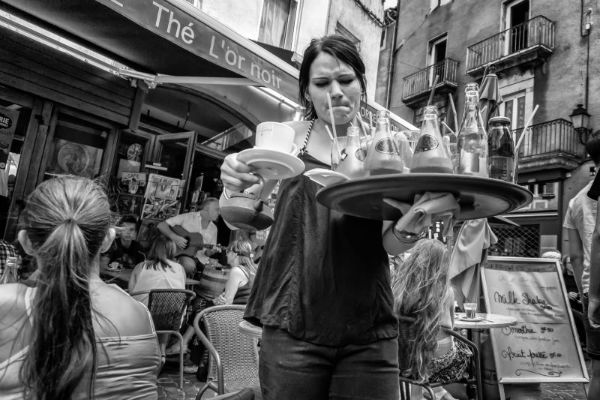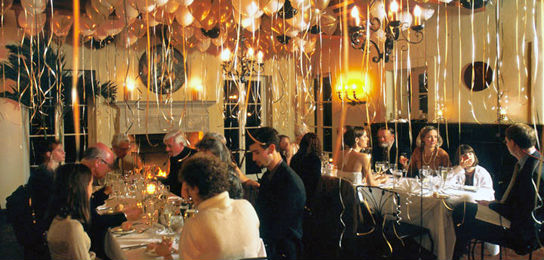When restaurant people have grouchy fits about bad tables, our complaints usually fall on deaf ears. Everyone loves to remind us that we shouldn’t complain because taking care of people—even if they are difficult—is what we get paid to do. Somewhat surprisingly, though, it’s not just outsiders who revel in telling us to shut up and do our job, industry people are guilty of it too. The most orthodox hospitality professionals can be less forgiving than the entitled guests we serve. It’s just a bizarre reflex that kicks in for some of us when we talk about hospitality in unicorn terms and I, for one, am sick of it. I’m tired of people making excuses for guest’s improprieties when, undeniably, if the most felonious among them behaved this way in any setting other than a restaurant they wouldn’t be tolerated. It is not our “job” to facilitate people’s bad behavior.
Being mistreated by paying customers isn’t part of the job as much as it is our allowing them to mistreat us. Part of the problem is that, as an industry, we’ve convinced ourselves that unconditional love for the guest—even when it requires self-degradation—is the nexus of hospitality. We live for the glory of taking the high road and the promise of turning frowns upside down. But there is a hidden cost to our psychology—like NFL players who take too many blows to the head—not only in absorbing the trauma but also in believing that we shouldn’t have the right to stand up for ourselves to make it stop. It takes its toll on your self-image and also begs the question: How far should a restaurant staff be expected to go to please someone who doesn’t deserve it? Is there a threshold when a guest’s behavior should render them undeserving of accommodation?
The truth is that hospitality work shouldn’t have to include accommodating people who are undeserving. We shouldn’t have to “turn people around” when they are perfectly capable of turning themselves around without being coddled. Unfortunately, we’re still expected to be accommodating even in the worst cases of guests misbehaving. When someone shows up to a restaurant drunk and unruly, the staff treads lightly—careful not to bruise the person’s inebriated ego. We routinely pacify guests who throw tantrums about their food taking too long or being seated past their reservation time. We sidestep silencing noisy tables who are disrupting other guests because we fear we might offend the noisemakers. The list of ways that we’re forced to cower in the name of good service is endless.
 Restaurant work often requires a firm hand, but because of these antiquated hospitality credos we struggle to use it authoritatively. When entitled VIPs or diva celebrities come in, kitchen and waitstaff are expected to break whatever rules necessary to make them happy because… well… that’s our job. In fine dining, we use the abbreviation “WTW” (whatever they want) and, in the wrong hands, it’s a blank check to satisfy the most sadistic impulses. When the dust settles, they leave happy but we leave physically and psychologically exhausted.
Restaurant work often requires a firm hand, but because of these antiquated hospitality credos we struggle to use it authoritatively. When entitled VIPs or diva celebrities come in, kitchen and waitstaff are expected to break whatever rules necessary to make them happy because… well… that’s our job. In fine dining, we use the abbreviation “WTW” (whatever they want) and, in the wrong hands, it’s a blank check to satisfy the most sadistic impulses. When the dust settles, they leave happy but we leave physically and psychologically exhausted.
The exhaustion stems from giving up so much of yourself to please others that you end up depleting your own emotional resources. When you spend every night bending for other people, it’s only a matter of time before you break. But all of this is exacerbated by the fact that, as an industry, we don’t speak up when we’re asked to bend too much. If we complain about being mistreated, then we’ve committed the cardinal sin of putting our needs above the people we serve.
It’s not all the guest’s fault. We could take better care of ourselves in house, too. Combustible chefs could slow their roll. Managers could stop micro-managing. The staff could stop drinking themselves into oblivion after work every night. But who can blame us for needing an exhaust pipe for all this aggression? To decompress after a hard shift, sometimes it seems like only a dirty martini will make us feel human again. But no matter how much we self-medicate it doesn’t change the fact that the source of our psychic congestion is the inherent imbalance that good service demands. Over time, putting ourselves second has a way of making us feel second best. Even though the customer isn’t always right, they are most definitely always first.



